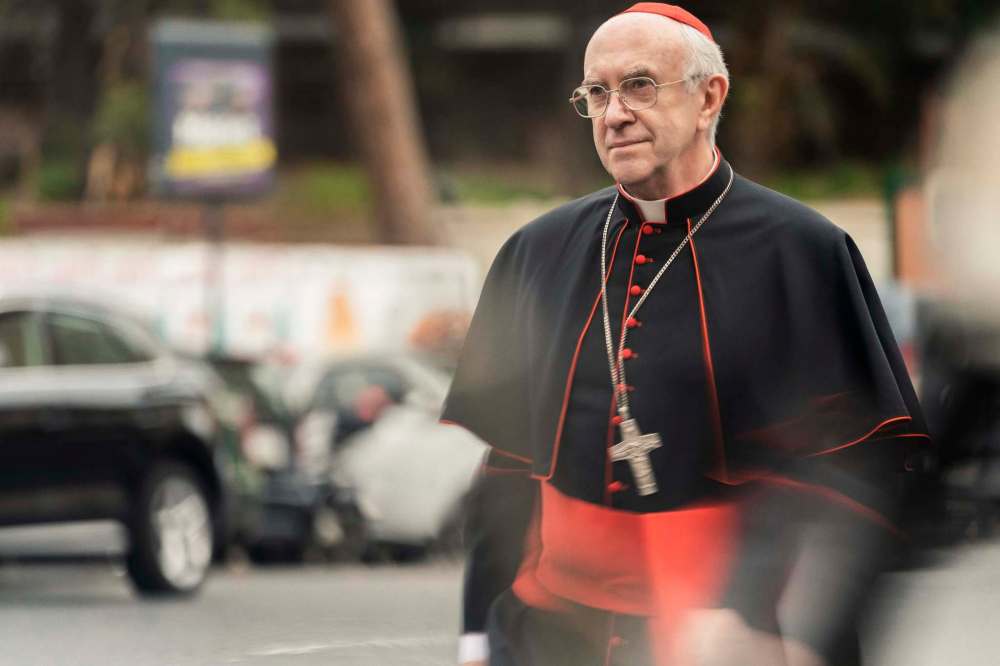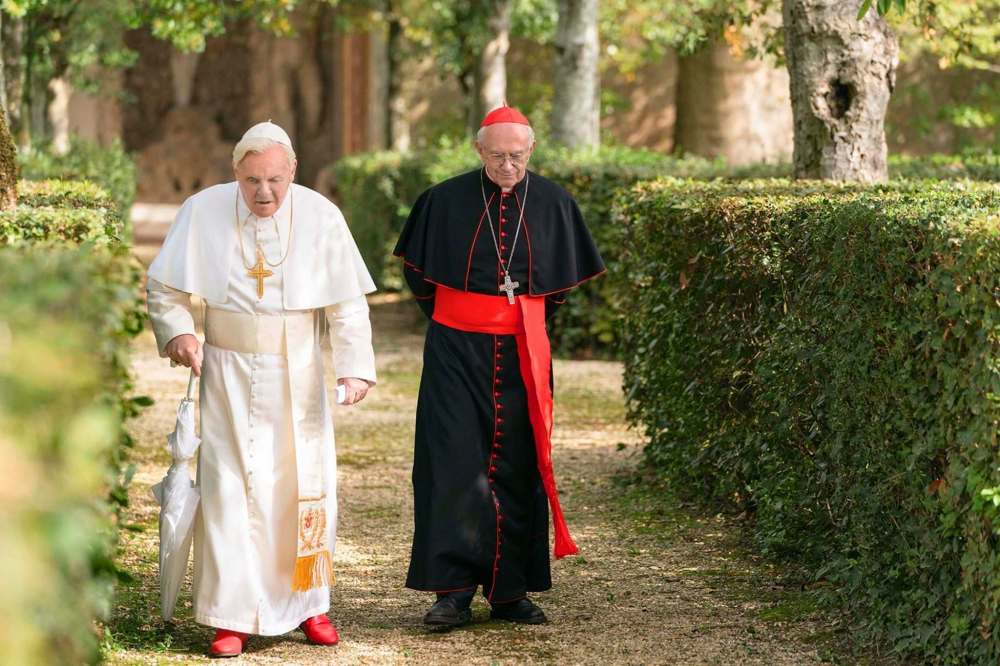Docudrama adds zing to papacy
Mismatched duo wrestle with theology
Advertisement
Read this article for free:
or
Already have an account? Log in here »
To continue reading, please subscribe:
Monthly Digital Subscription
$0 for the first 4 weeks*
- Enjoy unlimited reading on winnipegfreepress.com
- Read the E-Edition, our digital replica newspaper
- Access News Break, our award-winning app
- Play interactive puzzles
*No charge for 4 weeks then price increases to the regular rate of $19.00 plus GST every four weeks. Offer available to new and qualified returning subscribers only. Cancel any time.
Monthly Digital Subscription
$4.75/week*
- Enjoy unlimited reading on winnipegfreepress.com
- Read the E-Edition, our digital replica newspaper
- Access News Break, our award-winning app
- Play interactive puzzles
*Billed as $19 plus GST every four weeks. Cancel any time.
To continue reading, please subscribe:
Add Free Press access to your Brandon Sun subscription for only an additional
$1 for the first 4 weeks*
*Your next subscription payment will increase by $1.00 and you will be charged $16.99 plus GST for four weeks. After four weeks, your payment will increase to $23.99 plus GST every four weeks.
Read unlimited articles for free today:
or
Already have an account? Log in here »
Hey there, time traveller!
This article was published 13/12/2019 (2167 days ago), so information in it may no longer be current.
This bravura film, which follows a series of conversations between Pope Benedict XVI (Anthony Hopkins) and Cardinal Jorge Mario Bergoglio (Jonathan Pryce) before he became Pope Francis, is “inspired by true events” — such an elastic phrase.
It’s actually a hopeful fantasy, but I for one could use a hopeful fantasy right now. Lively and playful, but never cheaply satirical, The Two Popes makes serious points about the possibility of human change and the need for reconciliation in a broken world. Working with two outstanding lead performances, Brazilian director Fernando Meirelles (City of God), a vibrant visual stylist, and smart scripter Anthony McCarten (The Theory of Everything, Darkest Hour) have turned the drama of guilt and forgiveness, sin and salvation into cinematic pleasure.
Much of the action — and by action, I mean talking, walking and sitting — takes place between two papal conclaves and involves long conversations between two men with very different views. Benedict sees the Catholic Church as a bastion of “unchanging eternal truth” in a world beset by moral relativism and social chaos, while Cardinal Bergoglio sees the church as a way to challenge a global order that rests on economic inequality and environmental destruction.
Benedict warns against too much change too quickly: “If the church marries the spirit of the age, it will be widowed in the next,” he quotes. Cardinal Bergoglio counters that the church has always changed. “No angels until the fifth century,” he points out. “And then suddenly, angels are everywhere, like pigeons.”
There’s lots of clever back-and-forth banter — occasionally in Latin! — delivered with wily skill by two seasoned actors, but the real brilliance of the script is to move the two characters, slowly and subtly, toward common ground. Underneath the theological wrangling and political positioning — Cardinal Bergoglio, who was 76 when he ascended to the papacy in 2013, is petitioning Pope Benedict for permission to retire — this is a much more universal story of age, frailty and loneliness.
Both lead performances are considerable technical achievements. In the polyglot world of the Vatican, Pryce slips from Spanish to Italian (all subtitled) to English, and Hopkins does the same, with a smattering of German as well.
Pryce, who plays the Argentine cardinal with humour, humility and warmth, might appear to have the initial edge with his crowd-pleaser of a character. The man who will become Pope Francis likes to ride up front with his driver or take public transit. He adores football and tango dancing. He carries his own suitcase. He’s a Jesuit who tells Jesuit jokes.
The 81-year-old Hopkins, who is sometimes known for ham-boning it up, does quietly effective work here with a challenging role. Benedict is burdened by failing health, but even more by weariness and isolation.

The German Pope tells German jokes, he says, but nobody gets them. (“German jokes don’t have to be funny,” he explains.) Perhaps to soften him up a bit, the movie shows him playing the piano and watching reruns of Kommissar Rex, an Austrian TV show about a German shepherd that solves crimes. (“The trouble he gets into,” the Holy Father says with a chuckle.)
Just as McCarten freestyles with his “inspired-by-true-events” script, Meirelles cuts the ecclesiastical solemnity and the sumptuousness of the men’s surroundings with vivacious editing and a casual camera style. He brings in pop-inflected musical cues and interesting audio effects.
The film’s one weakness — and it’s surprising in a film that not only relies on talking but is able to maintain such energy and dynamism throughout long one-on-one conversations — is its use of flashbacks. Breaking up the main timeline are scenes in which the young Bergoglio is played by Juan Minujin. Here, The Two Popes operates in more conventional biopic mode, and while these sequences help to bring in the moral complexities of Bergoglio’s actions during Argentina’s Dirty War (1976-83), they are never effectively integrated into the present action.
That’s a minor weakness in a terrifically effective film. In the end, The Two Popes is a serious intellectual boxing match, an unexpectedly sweet buddy comedy and a gorgeous bit of movie-making. And if much of its dialogue is imaginary, its final newsreel depictions of the building of walls, the abandonment of refugees and the growing gap between rich and poor remind us that its central issues are very real and very urgent.
alison.gillmor@freepress.mb.ca


Studying at the University of Winnipeg and later Toronto’s York University, Alison Gillmor planned to become an art historian. She ended up catching the journalism bug when she started as visual arts reviewer at the Winnipeg Free Press in 1992.
Our newsroom depends on a growing audience of readers to power our journalism. If you are not a paid reader, please consider becoming a subscriber.
Our newsroom depends on its audience of readers to power our journalism. Thank you for your support.

